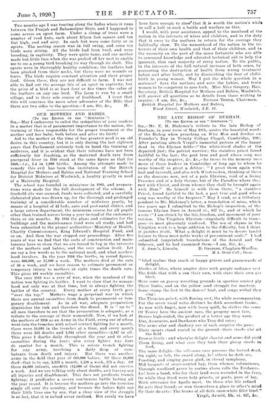OUR MOTHERS AND BABIES.
[To THE EDITOR OF THE " SPECTATOR."] SIR,—May I endeavour to enlist the sylispathies of your readers in a matter that is of paramount importance to the nation, the (raining of those responsible for the proper treatment of the mother and her baby, both before and after its birth?
Aid to the mother at the time of her greatest need is an old desire in this country, but it is only during the last eighteen years that Parliament seriously took in hand the (raining of midwives, and it is evident that their reforms have not been sufficiently fdr Leaching, as the maternal death rate from puerperal fever in 1916 stood at the same figure as that for 1860,—i.e., 1.4 in 1,000 births. Among the attempts made to remedy this evil has been the institution of the British Hospital for Mothers and Babies and National Training School for District Midwives at Woolwich, a locality greatly in need of a Maternity Hospital.
The school was founded in miniature in 1905, and prepara- tions were made for the full development of the scheme. A freehold site was secured, funds were collected, and a carefully elaborated plan was drawn up, for the thorough and prolonged training of a considerable number of midwives yearly, by means of a hospital of 42 beds, ante and post-natal clinics, and a large extern department, the minimum course for all pupils other than trained nurses being a year instead of the customary three or six months. By 1914 the plans and estimates for the buildings and the maintenance fund were all ready, and had been submitted to the proper authorities—Ministry of Health, Charity Commissioners, King Edward's Hospital Fund, and so on. And then the war stopped our proceedings. After five years of war we find that the costs of construction and main- tenance have so risen that we are forced to beg in the interests of the mothers and babies, and the very nation itself. Let me say a few words as to the national need, and what mother- hood involves. In the year 1918 the births, in round figures, were 660,000, or 13,800 a week. The mothers died at -the rate of 56 a week, and we have reason to estimate permanent or temporary injury to mothers at eight times the death rate. This gives 448 weekly casualties.
The year 1918 was a year of war, when the manhood of the nation was fighting its battles. I want to show that its woman- hood not only was at that time, but is always fighting the battles of the country. Every mother at every birth goes "over the top." Mothers wage a perpetual war in which there are annual casualties from death to permanent or tem- porary disablement. As in all war, adequate prepdration diminishes the risk and therefore the dread. It is " up to " all men therefore to see that the preparation is adequate, as a tribute to the courage of their womenfolk. Now, if we look at the mothers of 1918 as an Army in the Field, every one of whom went into the trenches with actual contact fighting for a month, there were 55,000 in the trenches at a time, and every month there were 243 deaths and 1,944 other casualties-2,187 in all. This gives 8 deaths daily throughout the year and 61 other casualties during the year; also every fighter was hors de combat for a month. This is severe trench fighting for any army, involving a daily drop of com- batants from death and injury. But there was another army in the field that year of 660,000 babies. Of these 64,000 died—that is to say, 5,333 a month, 1,230 a week, 175 a day. Of these 64,000 infants, one-fifth (12,800 of them) did not survive a week. And we-are talking only about deaths, and leaving out all injuries and disablement. This does not predicate trench fighting; it predicates a severe continuous battle lasting all the year round. It is because the mothers go into the trenches singly all over the country, and because the babies fight out their little lives one by one, that a clear view of the struggle is so lost, that it is indeed never realised. But surely we have
here facts enough to show that it is worth the nation's while to call a halt in such a battle and warfare as this.
I would, with your assistance, appeal to the manhood of the nation in the interests of wives and children, and to the duty that it owes to the mothers in return for the courage they habitually show. To the womanhood of tho nation in the in- terests of their own health and that of their children, and to the necessity on the part of the more fortunate who are able to command knowledge and educated technical aid to help the ignorant, that vast majority of every nation. To the public, in the interests of the full natural increase of both sexes, by preventing the destruction of health from wrong treatment before and after birth, and by diminishing the fear of child- birth in young women. May I put the whole question in a sentence? Save the mothers and save the babies, and train women to be competent to save both. Miss Alice Gregory, Hon. Secretary, British Hospital for Mothers and Babies, Woolwich, will answer all questions as to details from those wishing to


































 Previous page
Previous page